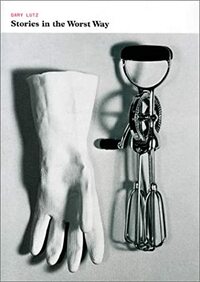Take a photo of a barcode or cover
"It was my mother who taught me the one worthwhile thing: when they ask if you like what you see in the mirror, pretend that what they mean is what's behind you—the shower curtain, the tile, the wallpaper, whatever's there."
Every single opening sentence of every single short story hit me like a big ole bus. incredible use of words.
Every single opening sentence of every single short story hit me like a big ole bus. incredible use of words.
A palette cleanser from a contemporary collection of short fiction only carried by ultra-specific pop culture/modern day references. Lutzs' rigorous wordplay, the turning nothing into something, was a breath of fresh air but ultimately.... exhaustive.
Such amazingly poetic lines, some humor and real attention to the terribly things about living in poverty of the mind and wallet. These stories fit together in a way utterly worth taking in and studying, esp if you are a poet between the poetry and fiction modes. You may love it if you like Bukowski. I abandoned this just past the halfway mark.
These pieces are work and they're worth the effort. Original and stunning, all around.
Probably the only reason I finished this book is because my flight was delayed and I had nothing else to do at the airport. I had high hopes. I love short stories and this was recommended to me by a couple "literary" folk. Huge disappointment. Could not relate to the stories/characters at all and I feel like Lutz was just trying to fill the page with a bunch of pretty words.
Their Sizes Run Differently is something else, and besides being something else it is also one of the best short stories ever written. Lutz really has her way with sentences.
The writing style reminded me of Milhauser but I am just not a fan of short stories that are so short and pointlessly surreal.
A summary wouldn't do this collection of varieties of domestic disturbance any justice, and of course a parody, as tempting as that might be, would be impossible to do right. To read Lutz is to enter an unfamiliar world tinged uncomfortably with the real. Or more prosaically, the other way around: a real world that's just… off. Kinked, somehow.
How Lutz has his way with language: not by twisting the sentences by force, or taking them apart to see how they work. They're not sentences where clauses flow to other clauses and end up as grand capillary assemblies of logic, as in a Javier Marias novel. Lutz's sentences are plain in structure, perhaps deliberately unpoetic in diction, but demand the rereading associated with poetry, so one can savor the unfamiliar syllables.
One might for instance, focus on the adverbs. Writers are instructed to use adverbs sparingly, but Lutz squeezes them in; you can almost imagine the satisfying pop they make as they slide into the sentences. Here the adverbs are splayed out more conspicuously for consumption.
Lutz conjures similar magic on the level of the sentence, or clause, even. Cliches when you least expect it. Gerunds baked from thin air. Participial phrases that wait for subjects and are found wanting. There's a faint oily undercurrent of humor running through it all, but none of it is found in, for instance, puns. Nothing so immediately obvious. The unsettling quality of the reader's amusement lies in the juxtapositions: of situations with characters, of adjectives with nouns.
His fiction is drawn from two wells: a more mannered, experimental style of writing with a twist of absurdist fiction. The surrealism comes from the situations that arise from the most ordinary settings: offices, bedrooms, convenience stores, apartments. Lutz employs the vocabularies of the same, of the routines of work, but in conjunction with bodies, familial relations. Bodies, especially, with talk of undernesses and perpendicularities. Unlike in airport thrillers, where the reader races ahead, skimming details, one is forced to slow down the rhythm when reading Lutz, to keep an eye out for the lane changes.
How Lutz has his way with language: not by twisting the sentences by force, or taking them apart to see how they work. They're not sentences where clauses flow to other clauses and end up as grand capillary assemblies of logic, as in a Javier Marias novel. Lutz's sentences are plain in structure, perhaps deliberately unpoetic in diction, but demand the rereading associated with poetry, so one can savor the unfamiliar syllables.
One might for instance, focus on the adverbs. Writers are instructed to use adverbs sparingly, but Lutz squeezes them in; you can almost imagine the satisfying pop they make as they slide into the sentences. Here the adverbs are splayed out more conspicuously for consumption.
Lutz conjures similar magic on the level of the sentence, or clause, even. Cliches when you least expect it. Gerunds baked from thin air. Participial phrases that wait for subjects and are found wanting. There's a faint oily undercurrent of humor running through it all, but none of it is found in, for instance, puns. Nothing so immediately obvious. The unsettling quality of the reader's amusement lies in the juxtapositions: of situations with characters, of adjectives with nouns.
His fiction is drawn from two wells: a more mannered, experimental style of writing with a twist of absurdist fiction. The surrealism comes from the situations that arise from the most ordinary settings: offices, bedrooms, convenience stores, apartments. Lutz employs the vocabularies of the same, of the routines of work, but in conjunction with bodies, familial relations. Bodies, especially, with talk of undernesses and perpendicularities. Unlike in airport thrillers, where the reader races ahead, skimming details, one is forced to slow down the rhythm when reading Lutz, to keep an eye out for the lane changes.
Lutz is a magician with verbs; creating new ones, using old ones in unexpected ways, etc. He tries mightily to do the same with adjectives and adverbs, which I found more often annoying than impressive, but still, there's probably not more than a handful of sentences in this book that you could find anywhere else.
As for plots, characters, emotional resonance, look elsewhere. Lutz isn't interested in that stuff. These are stories in the worst way, and in the loosest sense of the word - objects made of language. Lutz perhaps sums it up himself at one point: "...page after page of permutational wordliness that struck me as overpostponed progress toward a second, fuller language." Fine by me.
As for plots, characters, emotional resonance, look elsewhere. Lutz isn't interested in that stuff. These are stories in the worst way, and in the loosest sense of the word - objects made of language. Lutz perhaps sums it up himself at one point: "...page after page of permutational wordliness that struck me as overpostponed progress toward a second, fuller language." Fine by me.




